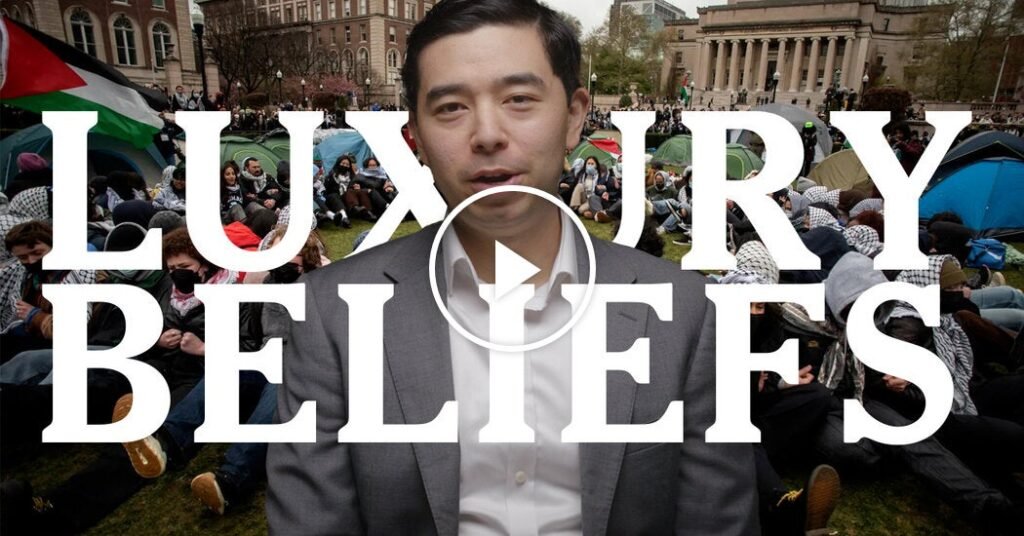The campus protesters have finally returned home for the summer, and they have left a lasting mark on history. What will their legacy be? [RECORD SCRATCH] A destructive trend in the social justice movement that goes far beyond college campuses. It’s self-centered, manipulative, and terrible for America. I call it extravagant belief. [MUSIC PLAYING] I am a rare doctor who grew up with all my possessions in a garbage bag from the age of 3. I lived in 10 foster homes before joining the Air Force. Then I went to Yale on the GI Bill and then to Cambridge. Along the way, I came up with the term “extravagant beliefs.” These are beliefs held by privileged people that make themselves look good but actually harm the marginalized. They are like virtue statements with consequences. “Defund the police.” “Why should we defund the police?” Take defunding the police, for example. A classic extravagant belief. This cause was most popular with the wealthiest Americans. The least popular were poor Americans, who are at least twice as likely to be victims of violent crimes as the middle class. Where I grew up, you were lucky to even call the police. Next, decriminalization of drugs. That’s another extravagant belief. “All drugs should be decriminalized.” “I want to decriminalize possession of drugs for personal use, and here’s why.” “Should crystal meth be legalized? The answer is yes.” The movement has the most support among highly educated Americans, but not as much support from those without college degrees, who are more likely to experience the downsides of the drug trade. My mother once strapped me to a chair while she was high. And I’m not the only one. Since 2000, the number of foster children killed by parental drug use has doubled. Extravagant beliefs are everywhere. Eliminate the SAT? “Four hours of my life gone in an instant.” SAT scores help underprivileged kids get into college. Refuse to marry? “I don’t think marriage makes any sense at all.” For poor kids, one of the strongest predictors of success is having married parents. As a child, I would have done anything to have two stable parents. Extravagant beliefs have three golden rules. Have you noticed campus protesters acting like refugees? Extravagant beliefs help many elites feel they deserve what they have. After all, today’s progressive activists are twice as likely as average to make more than $100,000 a year. “Why are you doing this to me?” “You guys are the worst!” At first glance, one would think these protesters would face serious consequences. “At least 45 pro-Palestinian protesters were arrested at Yale University this morning, police said. They were later released.” But if they were released without significant punishment, the risk is pretty low. [MUSIC PLAYING] “I have to take this right to this right wing. How do I get through this?” What bothers me the most is when privileged people claim to fight for the underdog but actually hurt them. Remember when the heir and fellow vigilantes confronted the cleaners at Columbia University? That was an example of extravagant belief translated into action. Privileged men fighting blue-collar workers in the name of the marginalized. “It’s just scary to think that I’m locked up with a bunch of crazy people.” Of course, not everyone at the protests is super privileged. “I said many times that I’m here because my family was killed, and as I was saying that on the megaphone, the police snatched the megaphone out of my hand and threw it behind me.” It’s great that privileged people care about injustice. But many of these people don’t know what they’re protesting against. “These are white kids from wealthy families who are conscious and spoiled, and they’re totally ignorant of the complexities of this issue.” Luxury cult activists turn the cause into a prop, drawing attention to what the students really want: themselves. “Do we want students to die of dehydration and starvation? This is basic humanitarian assistance we’re asking for. Like, everybody, please give me a glass of water?” [SINGING] “We will overcome this.” This is what protest looks like when they abandon the extravagant belief that “we will overcome this.” Protesters in the 60s were more serious, but they almost always practiced nonviolence. [SINGING] “Oh, we’ll get over it.” To be sure, no movement is perfect. But today’s students are simplifying complex geopolitical issues into a narrative of good and evil, destroying property and harassing people in the process. So how should they protest? Spread the narrative of everyone but their own. Spread the narrative of victimhood. And if taking a stand won’t get you a degree or a job, accept the consequences instead of protesting them. Instead, once their savior drama is over for the day, campus protesters can enjoy the ultimate luxury: someone to clean up their mess. “After a pre-dawn crackdown, UCLA’s campus is quiet and nearly empty, except for the cleaning crew.” [MUSIC PLAYING]

